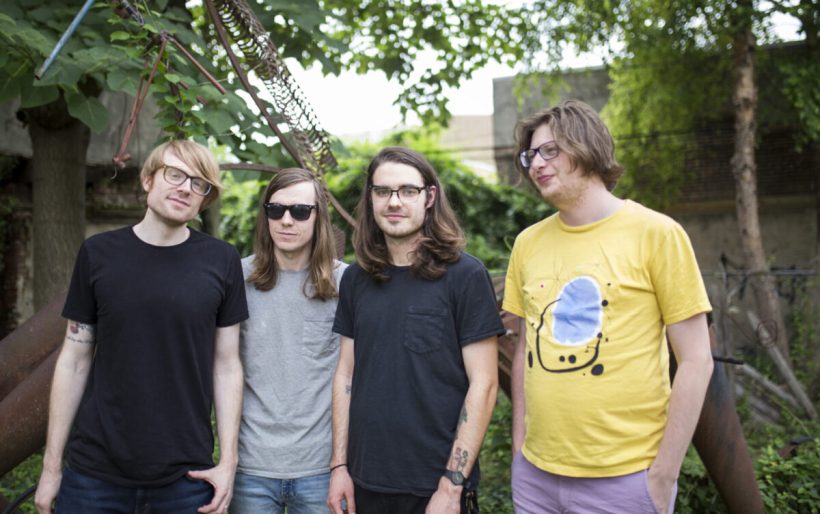I breathe a sigh of relief when Jake Ewald tells me he has a Weakerthans tattoo.
It’s a parallel I’ve often drawn on my own, with no prior knowledge of the ink confirming it. Ewald’s band Slaughter Beach, Dog is stylistically similar to the cherished aughties rockers in its combination of plaintive vocals, vivid lyrics, and dynamic power pop. Those qualities are at very much play in Safe And Also No Fear, the band’s third LP, released last month on Lame-O Records.
The two artists are also similar in terms of their creative trajectory: a songwriter emerging from a well-received punk band into more mature pursuits. For The Weakerthans’ John K. Samson, his origin was political Winnipeg hardcore outfit Propaghandi; for Ewald, it was Philadelphia emo favorites Modern Baseball.
But there’s always that nervousness that your comparison has completely missed the mark, and Ewald warmly laughs as he tells me that’s not the case at all. When he heard The Weakerthans, he heard his future as a songwriter. The formative bands he played in as a Maryland teen were sloppy, four-chord, generic rock outfits with terrible lyrics; his idea of punk was limited to Green Day, blink-182, and Say Anything, the latter of which used dense verses and cathartic choruses to convey turbulent teenage emotion, appealing to Ewald’s ambitions with wordiness and wordplay.
That was his starting point when he arrived at Drexel University in West Philadelphia and befriended his future bandmate Ian Farmer, as well as future Lame-O boss Eric Osman. The two of them introduced Ewald to The Weakerthans in the early days of Modern Baseball, and this more literary approach to punk blew his world wide open.
“I was like ‘oh, wait! This [style] doesn’t just have to be when I’m young and have all of these crazy emotions,” he says. “This can also be translated to getting older, this is a kind of music that can grow with me. There is a way to write music with a lot of words in it, that I don’t need to pigeonhole to when I was 18.”
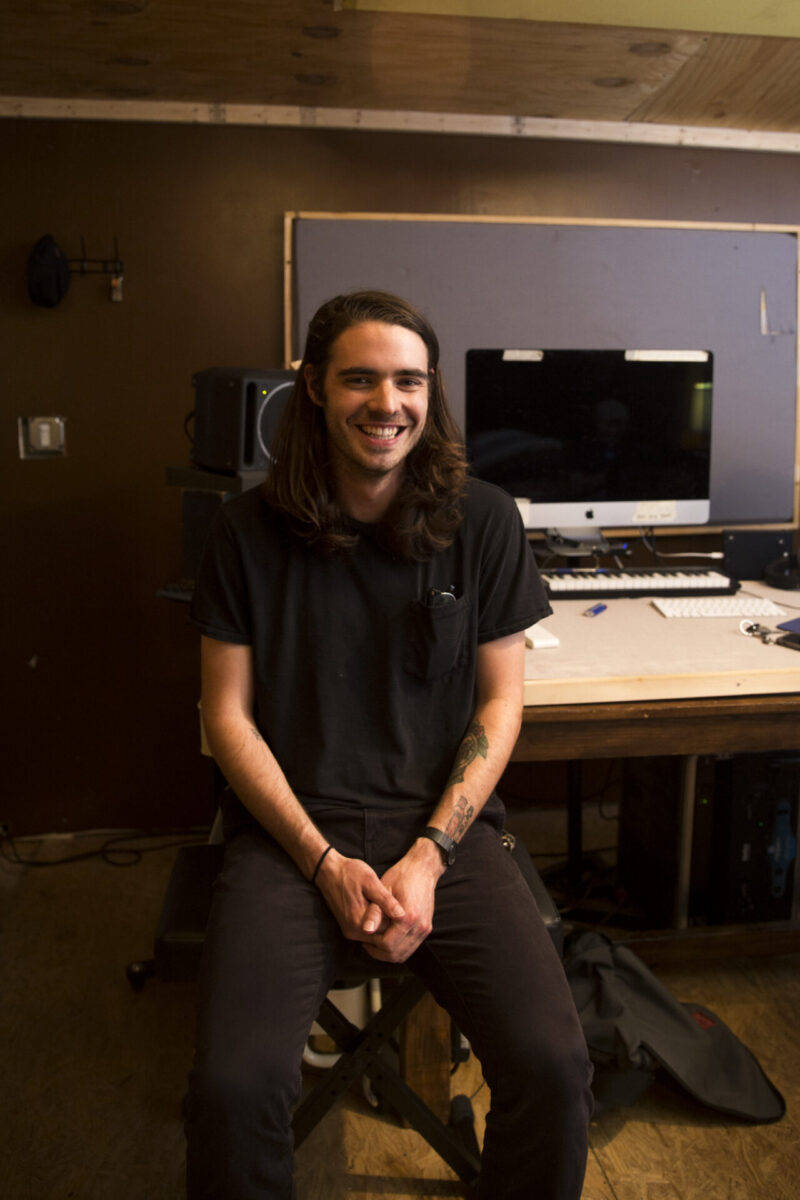
Slaughter Beach Dog | photo by Rachel Del Sordo for WXPN | racheldelsordophotography.com
Ewald is a 90s baby born and raised in region surrounding Frederick, Maryland, a city of about 71,000 people in the northwestern corner of the state. Bound by the Monocacy River, it’s a Lancaster-esque burg with canals and colleges, a downtown shopping district, and cornfields on the surrounding horizon.
Music was around the Ewald house during his childhood – his mom loves disco, his dad loves U2 and Dave Matthews Band — but it wasn’t exactly the stuff he was interested in playing. That came when he connected with a group of like-minded friends at high school who decided to give it a go putting on concerts. Baltimore or D.C were an hour and change away in either direction, and there were no small clubs around the corner that catered to upstart local musicians. Creating their own scene was a fun challenge, he recalls, but it was also a lot of effort.
“There was a community center in somebody’s neighborhood in the suburbs and we’d rent it out once a month,” Ewald says. “And the exact same 30 people would come every time. Because that was like their one opportunity to actually go to a show that was in the neighborhood, where they knew they were going to like the bands. But it was so funny because it was the same people [in the crowd] every time, the same people put it on, and the same bands played, and it was in the same building…so it was like not even a real creative experience.”
Ewald does appreciate that scene in Frederick for what it was, and acknowledges that teenage him thought it was pretty dang cool. It is, after all, where he and songwriter-guitarist Brendan Lukens met and formed a proto-version of Modern Baseball. But he realized the limitations of his hometown when he moved to Philadelphia in the mid-aughts for college, and found himself immersed in a rich web of near-constant basement shows, mostly situated in the blocks between Powelton Avenue and Spring Garden Street. That community of artists — Marietta and Mumblr and big-brother band The Wonder Years — made MoBo feel at home and inspired, and they had a successful run of three albums over the course of six years.
In the background, as a means of staying busy during periods of band inactivity, Ewald began sketching out songs on his own. He looks back on it as a means of keeping in constant practice during a period when so much of his identity was tied into writing music and performing it – though that purpose wasn’t exactly clear to him at the time.
“Back then, it was just this weird feeling where whenever I wasn’t producing something, whenever I wasn’t writing, I felt like something was missing,” he says. “Like I was doing something wrong. It was just kind of uncomfortable. So [writing solo songs] was really about ‘what can I try that’s different, that will jumpstart me to start feeling comfortable again.’”
As Modern Baseball wound down in 2017, this tool for jumpstarting creativity became Ewald’s primary focus.
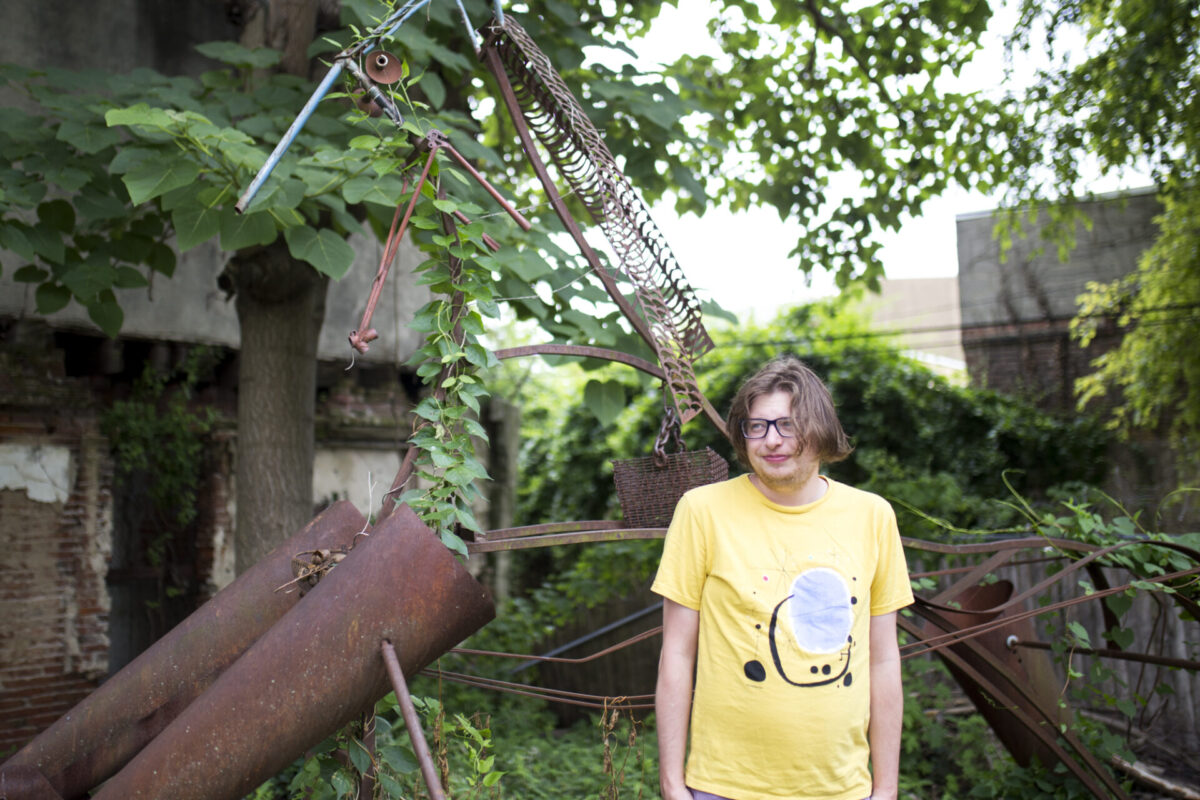
Slaughter Beach Dog | photo by Rachel Del Sordo for WXPN | racheldelsordophotography.com
Ian Farmer has a sheepish grin and a generally stoked demeanor; he loves music, he loves that he gets to work on music for a living, and he finds whatever angle into it that he can. We’re huddled in the control room of The Metal Shop, the East Kensington recording studio that Ewald and Farmer operate with Zack Robbins, and we’re chatting about how much the surrounding neighborhood has changed in the few years that these musicians have occupied the space. 50-odd condos are popping up across the street, just down the way from old brownstones that have been occupied by the same family for generations.
These musicians collectively gravitated to Kensington for the creative spirit that’s been bubbling up in the neighborhood over the past decade and a half. On the cover photo of Slaughter Beach, Dog’s LP Welcome, Ewald wears a muted purple dress and stands underneath a cartoonish purple cat that spans a painted wooden arbor leading into overgrowth at the corner of York and Emerald streets. Today, cat and arbor are both gone, and it’s pretty clear from the cluster of construction up the street what the corner’s future holds.
The team hopes to keep The Metal Shop in operation for as long as they can, though, rolling with the changes as they come and keeping their options open in the future. This is very much aligned with Farmer’s adaptable personality. He’s played numerous roles in Slaughter Beach, Dog since its inception, mastering the project’s first release (the Dawg EP from 2015) and playing guitar in the initial iteration of the live band, later switching to bass (his first instrument, and the one he played in MoBo) and contributing to recording and mixing throughout.
“I kind of just filled whatever role was necessary,” Farmer says, noting that he particularly relishes the behind-the-scenes involvement like mastering those early releases. “What everybody hears is Jake’s thing, but it’s like a second set of ears finishing it up. I got to be involved in a small way, without stepping too much into it and making it anything that was mine.”
Those roles began to shift even further as Robbins became involved – Ewald was impressed by his contributions to the rag-tag psychedelic outfit Sun Organ – and Nick Harris, a longtime guitar tech for Modern Baseball. If Dawg and Welcome were entirely the product of Ewald the songwriter and studio engineer trying to keep busy, and 2017’s Birdie was a group of players bringing a batch of fully-formed songs to life under Ewald’s direction, Safe and Also No Fear is Slaughter Beach, Dog’s first true “band” album, a collaboration that ran the gamut from the workshopping songs in jam sessions to tackling production in shifts.
“The whole band was doing everything, even down to mixing,” recalls Farmer. “It’s just like ‘Yo, I did a little bit…you want to tap in?’ ‘Yeah, cool!’ It was so entirely democratic and evenly-distributed.”
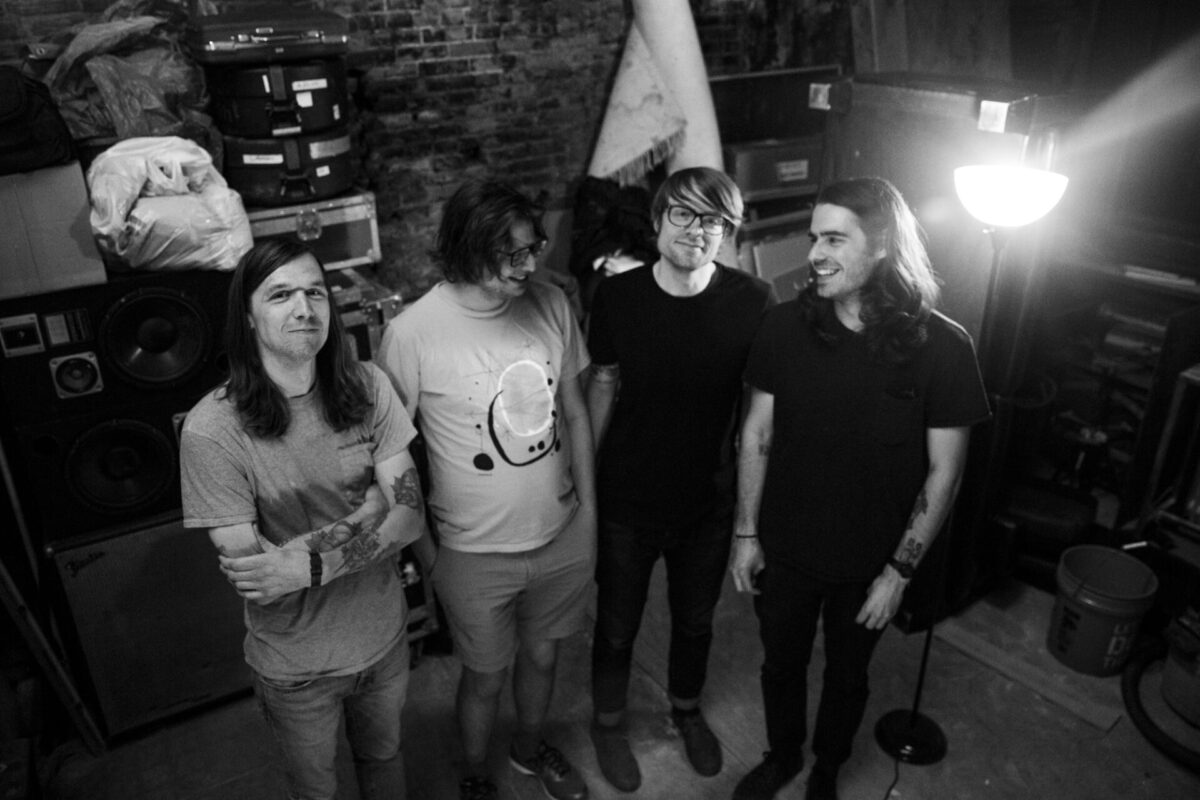
Slaughter Beach Dog | photo by Rachel Del Sordo for WXPN | racheldelsordophotography.com
The album also has a remarkably dynamic ebb and flow, moving from fervent acoustic rockers like lead single “Good Ones” and “Tangerine,” to delicate introversions like “One Down” and “Petersburg,” to songs that do both, like the simmering “Black Oak” which swells beautifully from a deadpan spoken word backed by an atmospheric pulse, into a bottleneck slide dreamscape, and further still into a powerful crescendo.
“There was a lot of trust involved,” Ewald says. “In a lot of those quiet parts, it is just so sensitive. It was harder for us to pull off when we were writing it. But we knew how each other would play and we weren’t afraid to say ‘let’s try making this quieter, let’s subtract the stuff. It’s gonna be more easily breakable, but I think that we can pull it off.’”
The power of subtraction is a big theme in Slaughter Beach, Dog. Farmer says that when the band was working on Birdie, they had a firm rule in the mixing process: if a bridge, or a guitar overdub, or percussion flourish wasn’t absolutely necessary to the song, it got cut. This rule was also in play on Safe, he continues, but it was unspoken this time around: it happened almost instinctively. “The four of us, our musical ideas are more that we want to get to the good stuff,” says Farmer.
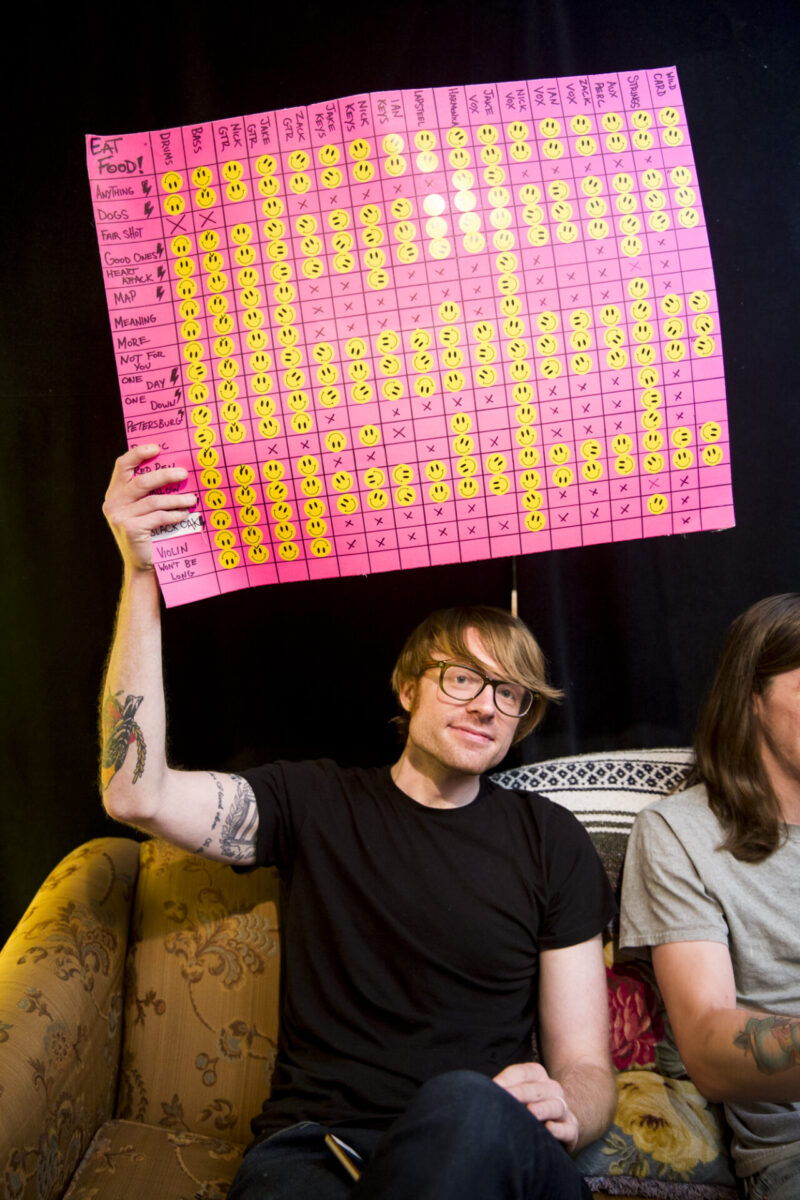
Slaughter Beach Dog | photo by Rachel Del Sordo for WXPN | racheldelsordophotography.com
The more explicit rule of subtraction was whittling down the number of songs they were working with. On Birdie, Ewald had written ten songs, and the band recorded ten songs. On Safe, they workshopped close to 20 ideas, then cut them in half for the ten songs that make up the record.
“It was not easy,” says Robbins, “But after a while it became clear which direction the songs would go.”
“There were a certain number of songs that all of us felt like, ‘well, yeah, obviously these belong together,’” adds Harris. “And it became less of a decision about ‘is this song stronger than this song,’ and instead ‘does this group of songs belong together more than this group of songs.’”
I nod emphatically at hearing this, as it perfectly aligns with my take on Safe and Also No Fear as a capital-A album. Sure, it has “Good Ones” filling that still-essential lead single role, and the bustling “Heart Attack” serving as a second-half standout, but this is less a collection of disparate singles and more a cohesive body of work, with each track mutually reinforcing the other. It ebbs and flows, whispers and shouts, and demands to be experienced as a whole rather than in playlisted pieces.
“We are all album listeners,” Ewald says. “That’s how we prefer to experience music. I feel so lucky to have ended up in a position where we got to pick, within the scheme of an album, which [songs] make the most cohesive and the most interesting journey.”
Farmer lights up when we talk about this part of the process – for him, it’s an obvious source of joy.
“There’s nothing more fun than cutting songs from a record,” he says, a sentiment I’ve heard literally no one share before. But it’s a profound one. “It’s almost like trimming the fat to make it as good as it could be — quality over quantity.”
And in 2019, leaving out lesser but still-worthy songs has less of a morbid finality than it did 20 or 30 years ago; these aren’t artifacts lost to the ages until some rarities compilation makes its way into the world. “There are so many ways to put out songs now,” Farmer says. “The internet has given us [the ability to] do whatever we want. So for a song not to make it onto a record doesn’t mean that it has to die and fade away and nobody knows about it. So it’s kind of exciting, even to cut songs that you really love and care about.”
That philosophy around subtraction, around less-is-more, especially applies to Ewald, and how he wrote the lyrical stories that are the beating heart of Safe and Also No Fear.
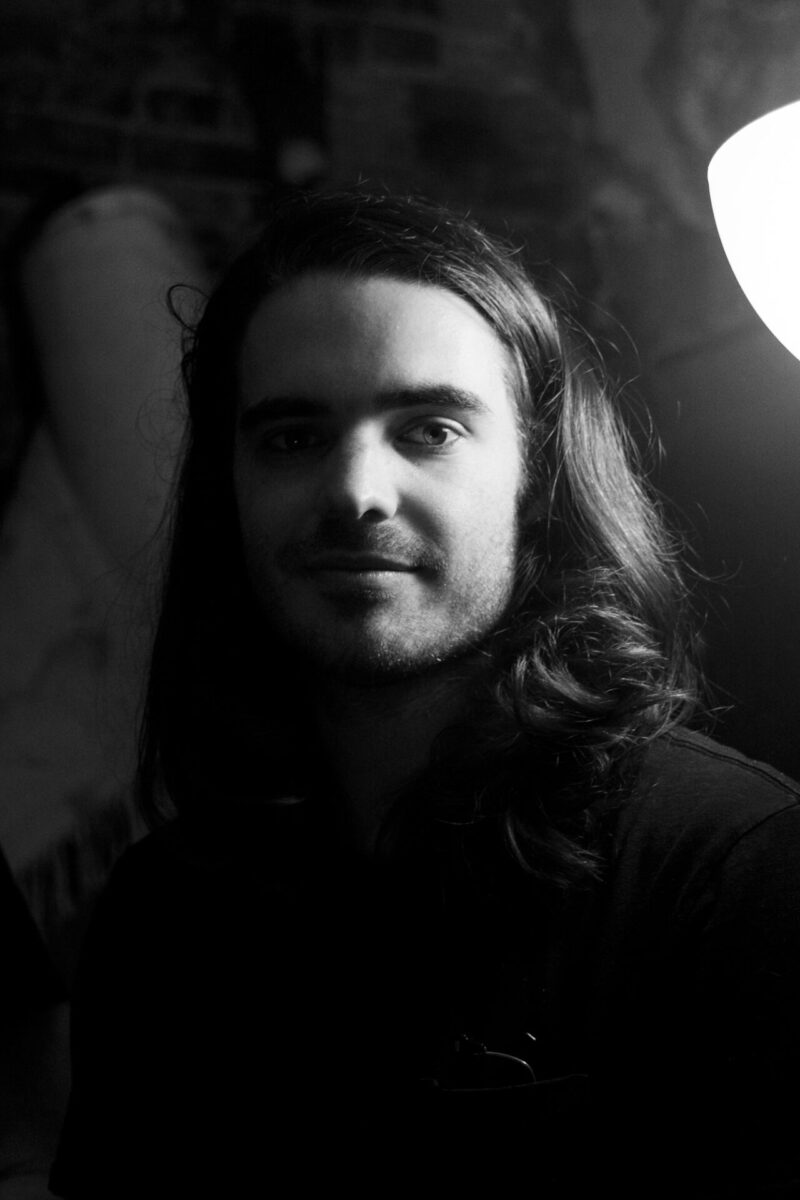
Slaughter Beach Dog | photo by Rachel Del Sordo for WXPN | racheldelsordophotography.com
I’m reminded a great deal of Sofia Coppola’s Lost In Translation as I peruse the lyric sheet of Safe and Also No Fear. Not a lot happens in the film: wrestling with insomnia, Bill Murray and Scarlet Johansson meet in a Tokyo hotel bar; they sightsee, sing karaoke, have an awkward lunch, and part ways. There’s not the sense of a life-changing journey, an arc from point A to B that hack English teachers have for decades positioned as proper storytelling. And yet, Lost In Translation is so much more emotionally resonant than any sweeping epic. Its two leads are vastly different people at different stages of their lives who find a fleeting common bond over their dysfunctional marriages, their loneliness in a strange city, and their search for happiness that doesn’t exactly end happily (but not unhappily either).
Similarly, the stories that Ewald tells in his songs are not journey-stories, but snapshots, or character sketches. Most involve unnamed characters who spend a couple verses and refrains observing and reacting to their surroundings, or to themselves in relation to their surroundings. “The Dogs” finds a character taking an early morning walk up York Street to meet a friend. “Heart Attack” is a litany of thoughts going through somebody’s mind as they wait for a phonecall. The pensive closer “Anything” is very specifically about aging, with the brilliantly blunt line “You were five and you were ten and you were nineteen / One day you’ll be eighty four.”
On Safe’s “One Down,” Ewald uses eight unrepeated stanzas to capture the anxiety of person adrift in their life, uncertain of their place. In one verse, he evokes Frederick: “We drive around / Our old hometown / They lit that football field on fire / In ’99.”
He also uses very small but telling details in “Tangerine,” where the single verse “Walking 8th Avenue / Taped up Payless soccer shoes / Hunts down smokes and Mountain Dew / Waits for something else to do” give the listener (and reader, since these lyrics are definitely meant to be read as much as heard) more of a sense a person that pages of exposition possibly could.
“There is something about removing a lot of the fluff and leaving just these little details that you take for granted in everyday life,” Ewald says. “When you address them specifically, they are so affecting.”
